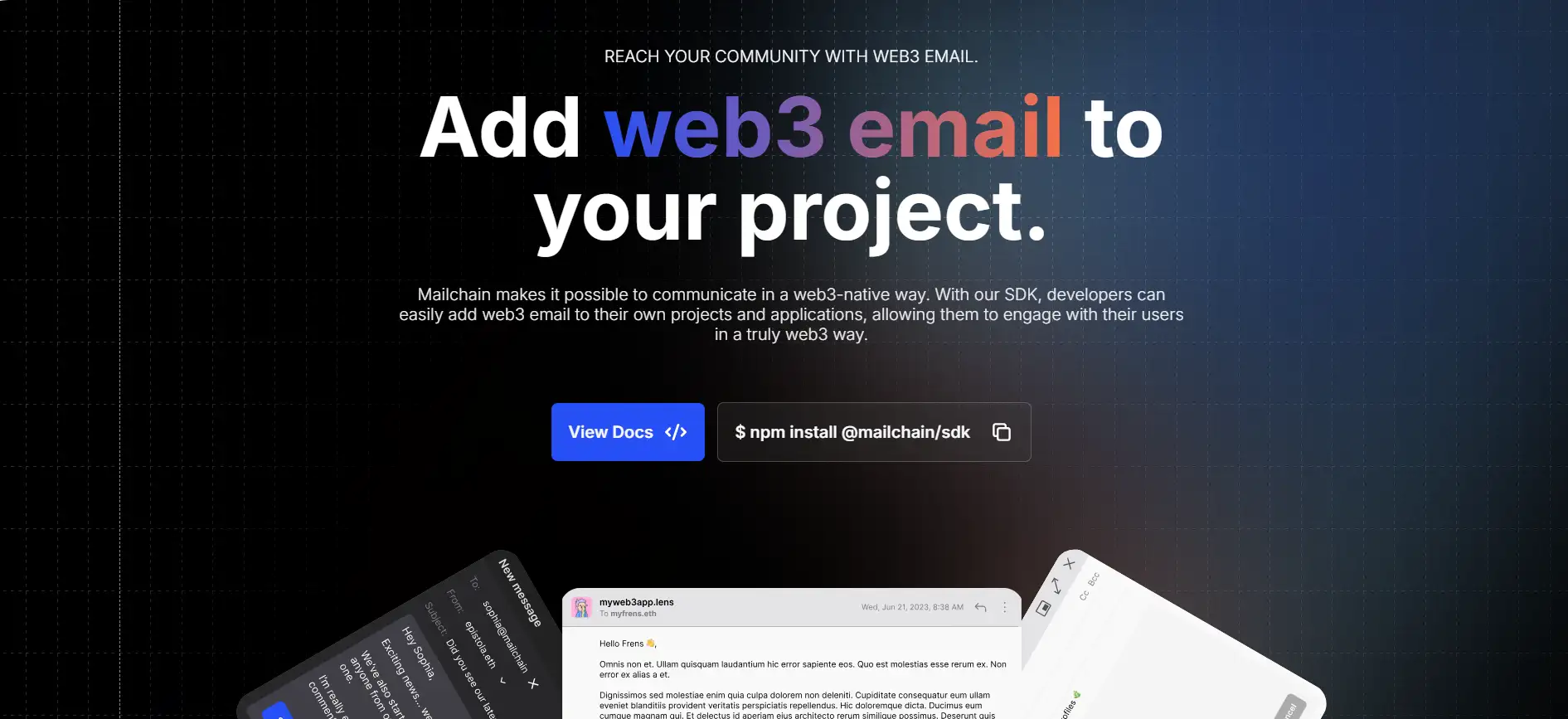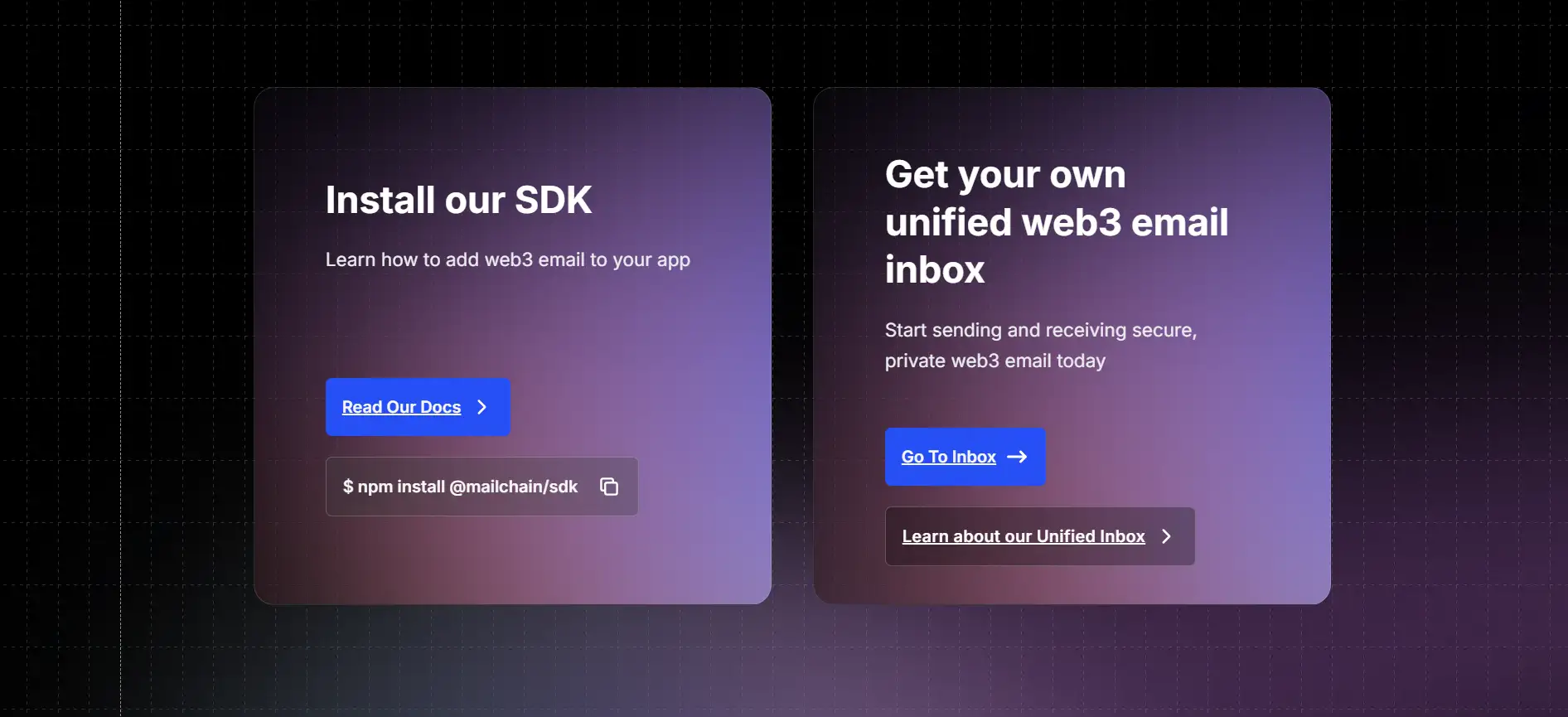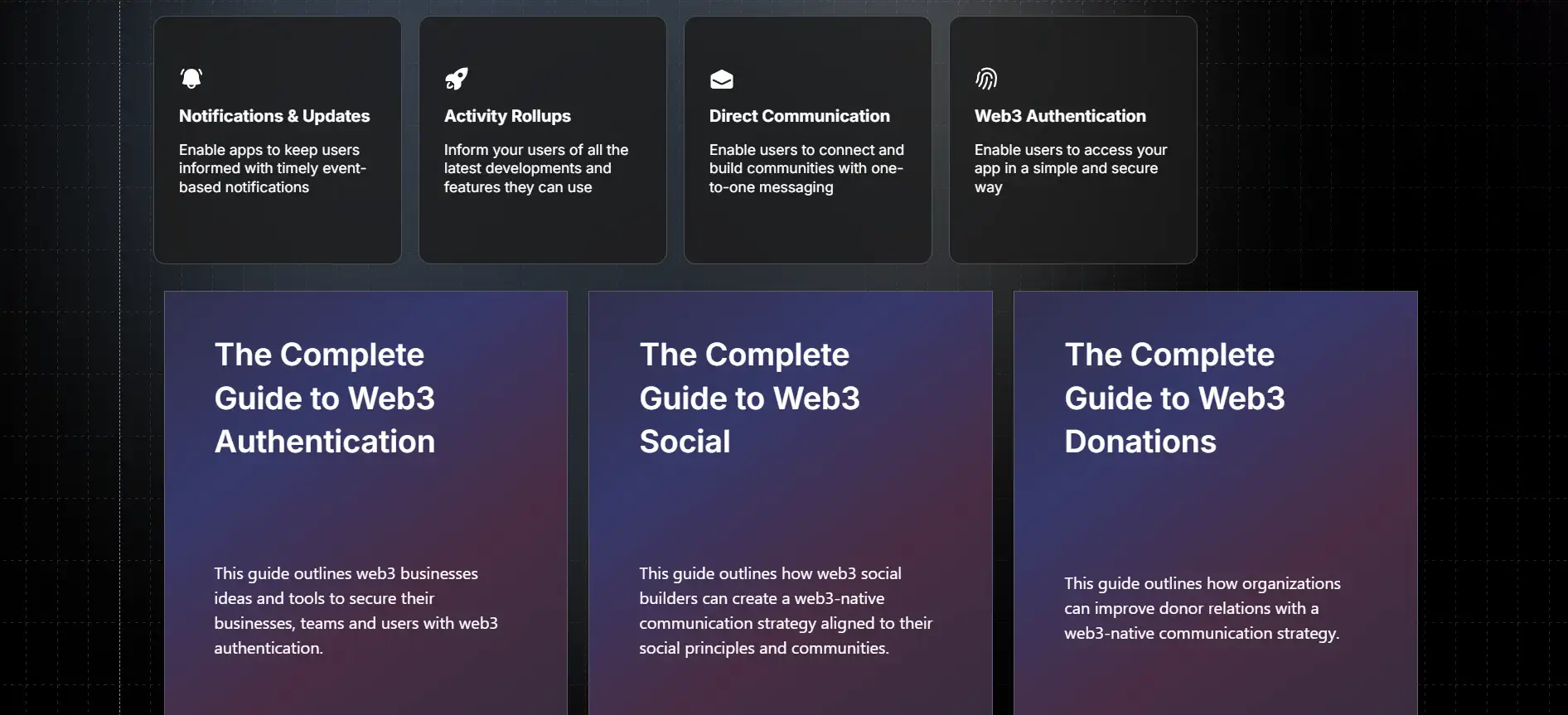About Mailchain
Mailchain is a next-generation communication platform designed for the decentralized web. It introduces a Web3-native email protocol that enables users to send and receive messages using blockchain wallet addresses rather than traditional email IDs. With support for Ethereum, Solana, NEAR, and other major blockchain ecosystems, Mailchain enables direct and secure interactions between users, communities, dApps, and DAOs across chains. By offering a unified inbox that respects ownership and privacy, Mailchain redefines communication infrastructure for Web3.
At its core, Mailchain promotes user sovereignty, end-to-end encryption, and digital identity control. Unlike Web2 email platforms that monetize user data, Mailchain ensures that all communication remains private and censorship-resistant. It supports multiple identities per user and is built to scale communication needs without compromising decentralization principles. The platform serves individual users, developers, and enterprises aiming to embed seamless, secure communication into their Web3 workflows.
Mailchain was developed in response to a growing gap in the blockchain ecosystem: the lack of a privacy-preserving, native communication layer. While Web3 enables decentralized financial systems, NFTs, and DAOs, it lacked a reliable, user-friendly way for blockchain addresses to exchange messages. Mailchain solves this by offering a multi-chain compatible, encrypted messaging protocol that uses existing wallet addresses as email endpoints. Its primary objective is to bring the benefits of modern communication—such as inbox organization, notifications, and one-to-one messaging—into the decentralized internet without relying on centralized intermediaries.
The development of Mailchain emphasized user experience as much as technical integrity. It abstracts away complex key management by using a secure identity key for message signing and encryption. Messages are not stored on-chain, avoiding cost and scalability issues, but are still end-to-end encrypted and only accessible by the sender and recipient. Developers can easily integrate Mailchain using its TypeScript SDK, and many open-source examples are available to accelerate adoption. It’s already integrated into major ecosystems such as NEAR and Tezos, and supports identity systems like ENS and .lens profiles.
A major benefit of Mailchain is its multichain compatibility. It supports all EVM chains, positioning it well as a cross-protocol solution for Web3 communications. Its competitors in concept include projects like Push Protocol (formerly EPNS), which focuses on decentralized notifications, and Dialect, which provides similar messaging for the Solana ecosystem. However, Mailchain stands out due to its support for unified inboxes across chains, customizable identity profiles, and comprehensive privacy-first design.
As adoption grows, Mailchain’s communication standard could become foundational to how Web3 users and applications interact. Whether it's an NFT marketplace sending updates, a DAO coordinating efforts, or a user simply wanting private wallet-to-wallet messaging, Mailchain provides the tools and infrastructure necessary to enable that securely and natively.
Mailchain provides numerous benefits and features that make it a standout project in the Web3 communication space:
- Unified Web3 Inbox: All your wallet addresses across multiple chains can be managed in one secure inbox, simplifying communication without compromising privacy.
- End-to-End Encryption: Every message is encrypted using identity-based cryptography, ensuring only the sender and recipient can read the contents.
- Multi-chain Compatibility: Mailchain works with Ethereum, Solana, NEAR, Tezos, and other EVM-based chains, enabling cross-chain messaging.
- Developer Friendly: With an open-source TypeScript SDK and extensive documentation, it’s easy for developers to integrate Mailchain into dApps.
- Privacy-First Approach: Mailchain does not store or access private keys or sensitive data. Your identity and communication are entirely under your control.
- Web3 Identity Support: Users can link ENS domains, .lens profiles, and other handles to create recognizable and trusted messaging identities.
- Use Cases: Enables wallet-to-wallet messaging, community updates, decentralized notifications, and business-related communications such as invoices and receipts.
Getting started with Mailchain is simple and straightforward. Whether you're an individual user or a developer, here’s how to begin:
- Create Your Account: Visit Mailchain Inbox and sign up using your Web3 wallet. Mailchain supports wallets from various chains, so you can connect Ethereum, Solana, or other EVM-compatible wallets with ease.
- Claim Your Web3 Inbox: Once registered, your wallet address becomes your Web3 email. You can also link ENS or .lens profiles for more personalized handles.
- Send and Receive Messages: Begin sending encrypted messages to any compatible address. Your communications will be private, secure, and free from centralized oversight.
-
For Developers: Install the SDK using
npm install @mailchain/sdk. Check the developer documentation at Mailchain’s website for integration guides and code examples. - Use in Your dApp: Mailchain's SDK allows you to embed Web3-native email into your applications, enabling features like transactional messaging, dApp notifications, DAO coordination, and user verification.
- Explore Use Cases: Dive into Mailchain’s resource library to learn how to implement features like Web3 donations, social communications, and authentication.
Mailchain FAQ
Yes, Mailchain supports the use of personalized Web3 identity handles such as ENS (.eth) and .lens profiles. When you connect your wallet to Mailchain, you can map these identities to your inbox, allowing others to message you at something like
yourname.ethorhandle.lens. This makes communication more intuitive and recognizable while maintaining privacy and encryption.Mailchain employs a privacy-first architecture that keeps messages off the blockchain, avoiding high costs and scalability issues. Instead, messages are transmitted through its own encrypted messaging protocol, which uses identity keys and signing/encryption key pairs. This design ensures that messages are end-to-end encrypted and can only be read by the intended recipient, with no need to store them on-chain or rely on centralized servers. Learn more at Mailchain's website.
No, you don't. Mailchain supports a unified inbox that brings together all your messaging activity across different wallets and blockchains. Whether you're active on Ethereum, Solana, NEAR, or another supported network, you can consolidate all identities and communications into a single interface. This approach simplifies multichain interactions without compromising user privacy or control.
Absolutely. DAOs can use Mailchain to privately message contributors, send proposals, updates, or notifications without relying on Discord or public forums. Each contributor’s wallet address acts as a communication endpoint, enabling secure, targeted messaging. Since Mailchain messages are encrypted and sent wallet-to-wallet, DAOs can coordinate with confidence, knowing their information isn’t being exposed or intercepted.
Mailchain offers a fully documented, open-source TypeScript SDK that allows developers to embed secure messaging features into any dApp, NFT marketplace, or DeFi platform. Developers can use the SDK to send transaction-based notifications, private messages, or onboarding sequences tied to wallet activity.
You Might Also Like












